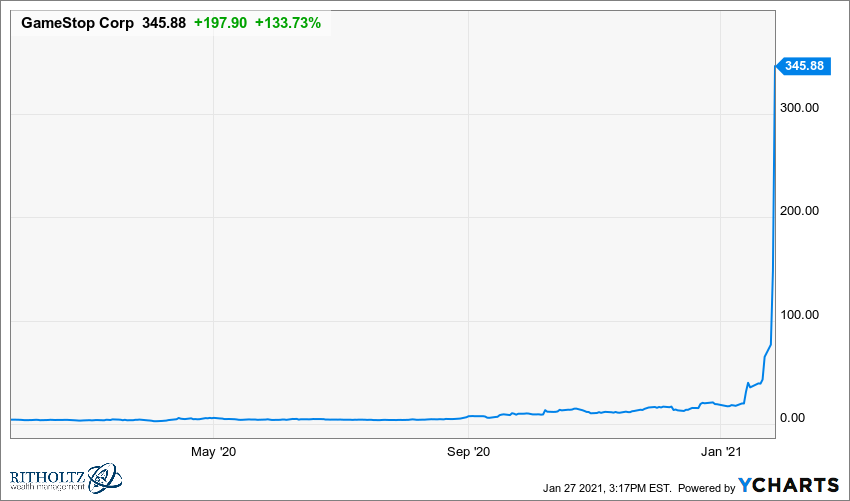Never let a crazy market go to waste.
GameStop’s astronomical rise of over 600% in two weeks is no exception.
It seems a bunch of people on a Reddit message board and some trading Apps got together and plotted a strategy to stick it to the hedge funds. The Hedgies established massive short positions in the stock, and now it was time for some payback.
Some hedge funds profit by locating distressed businesses’ and making bets their stock price will plummet. They do this by borrowing the targeted shares and hopefully repurchasing them at a much lower price.
The difference between the two prices will determine their possible profit.
Short sellers are essential to properly functioning markets. Acting as investing police, uncovering fraud and other corporate shenanigans.
This trading journey is fraught with many perils, like GameStop going from $19 to $335 in less than a month.

They ran into a perfect storm—an army of young day traders. Angry and cooped up by the pandemic, they trained themselves to make prop bets on sports gambling sites and are now hunting for greener, more profitable pastures to unleash their wrath..
Rich hedge fund managers became the perfect outlet for their pent up aggressions. These young traders turned one of the hedge funds’ favorite strategies against them in a form of trading jiu-jitsu.
Anti-establishment behavior is a feature and not a bug of our Democracy.
One can look at this in two ways. The first is the glass half empty scenario. The markets are broken; these young kids are anarchists looking to destroy our financial system, Yadda Yadda Yadda.
The alternative is to view this as a teachable moment. (No pun intended)
There are many long-term lessons to be learned if you can ignore the vitriol on social media.
- Short selling is dangerous. We’re watching in real-time professional money managers who sold a stock at $6, having to repurchase it at $345! Historically markets go up two out of every three years. Betting against the tide is fraught with risk. Besides, if you purchase a stock at $6 without using any borrowed money or margin, the most you lose is $6 for every share you own. If you short the same stock, theoretically, the most you can lose is infinity. It’s better to learn this lesson at 17 than 71.
- Supply and Demand Rules All. Never mind the crap they teach you in H.S. Economics class about Widgets. When stocks are shorted, it reduces their supply; when panicked investors are forced to repurchase them, the increased demand provides the rocket fuel for crazy stuff to happen. Explaining GameStop in terms of supply/demand provides an opportunity to teach a young person how our entire economy’s pricing model works, from toilet paper to stock prices.
- Momentum investing is a real strategy. Wall Street types like to use sophisticated names and jargon for simple things. A momentum strategy is simply about buying stocks that are currently going up. GameStop is an example of this strategy on steroids. Most strategies work if you stick to them. Understanding momentum investing is a lesson that could last a lifetime if applied under the proper parameters like using technical analysis and other guard rails.
- Emotions rule the markets over the short term. When a simple tweet from billionaire Elon Musk ignites a struggling companies stock price to rise over $100 in less than 24 hours, the jury rests its case. The sooner young people understand that emotions rule most investors’ decisions, the faster they can undertake measures to become self-aware and create strategies for overcoming this hurdle.
- Investing can be fun. The markets of full of drama. Heroes and villains are everywhere. It’s like a massive video game played by billions of people trying desperately to outsmart each other. Getting kids interested in investing at an early age is the ultimate life hack. GameStop’s story could serve as a gateway drug to a lifetime of wealth creation if these lessons, both good and bad, are properly taught and, more importantly, heeded.
No one knows how long this crazy story lasts or how it will end. My guess is there will be a lot of tears shed.
On the bright side, wild times provide invaluable material for a lifetime of condensed learning if you know where to look. Don’t let this one go to waste.
I know I won’t.





